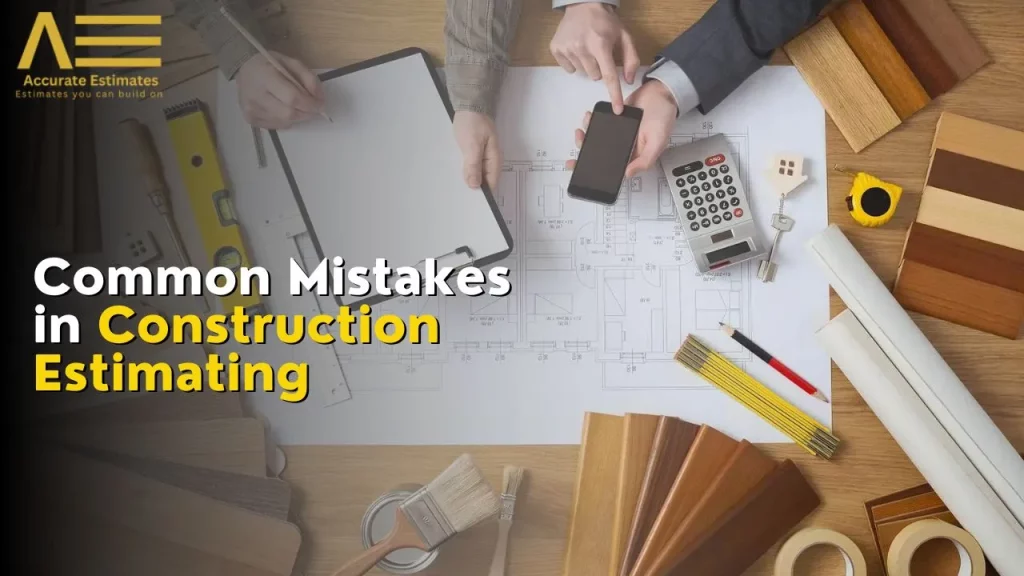Common Mistakes in Construction Estimating
The estimation process plays a crucial role in the construction sector, determining whether a project will succeed or end up failing. Accurate and reliable cost estimation is essential for winning profitable projects, controlling expenses, and maintaining competitiveness in the industry.

However, errors in cost estimation can have significant financial and operational impacts. The success of construction projects is contingent upon numerous factors, with cost estimation being one of the most crucial yet frequently overlooked aspects.
What is Construction Cost Estimation?
Predicting the financial expenditure required to carry out a building project is the basic idea behind construction cost estimation. Additionally, it involves a meticulous evaluation of all expenses involved in the project, from raw materials to labor and everything in between. This estimate provides a projected budget, aiding in informed decision-making, resource allocation, and cost planning.
Why is Construction Cost Estimation Important?
The significance of construction cost estimation cannot be overstated. It lays the groundwork for the entire project, allowing stakeholders to determine its financial viability and potential profitability. Accurate cost estimation offers a roadmap for prudent resource management, ensuring that projects don’t spiral into economic chaos midway. With proper analysis, projects can handle delays, unexpected expenses, and even abandonment due to unmanageable costs.
The Elements of Construction Cost Estimation

Material Costs
Material expenses are the foundation of any construction endeavor, covering expenses related to base materials like concrete, metal, wood, and other building materials. Accurate assessment of material costs prevents underestimation, leading to potential shortages and delays.
Labor Costs:
Human resources reasons another significant expense like Labor costs include for the salaries, benefits, and other compensation for the workforce involved in the project. Estimating labor costs accurately ensures enough workers to meet project demands without unnecessary financial burdens.
Equipment Costs
Your building project relies on various equipment, from heavy machinery to specialized tools, and Estimating equipment costs includes determining rental or purchase expenses, maintenance, and operational costs.
Subcontractor Costs
The majority of projects involve specialized tasks best dealt with by subcontractors, and estimating these costs helps to identify reliable subcontractors, prevent payment disputes, and maintain project quality.
Overhead Costs
Overhead costs encompass the indirect expenses that keep the project running, such as office space, utilities, and administrative salaries. These costs are often overlooked but play a vital role in overall project sustainability.
Profit
Every construction building project aims for a profitable outcome by estimating a reasonable profit margin ensure that the project covers costs and generates stakeholder revenue.
How to Create an Accurate Construction Cost Estimate?

Gather Accurate Information:
Reliable information is the foundation of accurate estimates, and it is done by very carefully assessing project plans, specifications, and requirements to avoid miscalculations.
Use a Reliable Estimating Software
In this era of technology, specialized software can streamline the estimation process. These tools integrate data, formulas, and industry trends to provide more precise estimates.
Get Quotes from Subcontractors
Working side by side with subcontractors to gather quotes on specialized work provides a realistic picture of expenses and aids in budget allocation.
Build in a Contingency Fund
Random circumstances are an inherent part of the construction. A contingency fund cushions against unexpected expenses, reducing the risk of cost overruns.
Importance of Cost Estimation
Avoid Project Delays:
Accurate estimates facilitate smoother project timelines by preventing shortages of resources and funding.
Prevent Cost Overruns:
Construction projects notorious for exceeding budgets often suffer from poor cost estimation. Accurate estimation minimizes the likelihood of going over budget.
Improve Cash Flow Management:
With precise cost projections, financial planning becomes more effective, ensuring funds are available when needed.
Make Better Business Decisions:
Reliable estimates empower decision-makers to assess project feasibility, choose strategic investments, and allocate resources optimally.
You can read about the importance of construction cost estimation in detail here.
Conclusion
In the intricate tapestry of construction management, the thread of cost estimation weaves everything together. Accurate construction cost estimation is the linchpin that stabilizes a project’s financial and operational aspects. By meticulously accounting for material, labor, equipment, subcontractors, overheads, and profit, you build a sturdy foundation for success. As the construction industry evolves, this fundamental practice remains unwavering, ensuring projects are completed on time, within budget, and with their financial integrity intact.
FAQs
- Why is cost estimation crucial in construction projects?
The complete cost estimation is very important because it helps with financial planning, prevents overruns, and ensures project viability.
- How do material costs impact overall estimates?
Material costs form the core of estimates, and errors in calculation can disrupt the entire construction process.
- What role does technology play in cost estimation?
Estimating software enhances accuracy by considering data and industry trends.
- Why should subcontractor costs be included in estimates?
Subcontractor expertise often translates to specialized tasks, and estimating their costs prevents financial surprises.
- What’s the purpose of a contingency fund in estimates?
A contingency fund is a safety net against unexpected costs, bolstering project resilience.
- How does accurate cost estimation improve cash flow?
Precise estimates enable better financial planning, ensuring funds are available when needed.
- Can accurate cost estimation influence project decision-making?
Relational estimates empower stakeholders to make informed resource allocation and investment decisions.
- Summarize the importance of cost estimation.
Construction cost estimation is the keystone that supports project success by fostering financial stability and preventing unforeseen disruptions.


